Huntingdon Court Residential Home Encourages Calm and Creativity Through Colouring and Word Searches
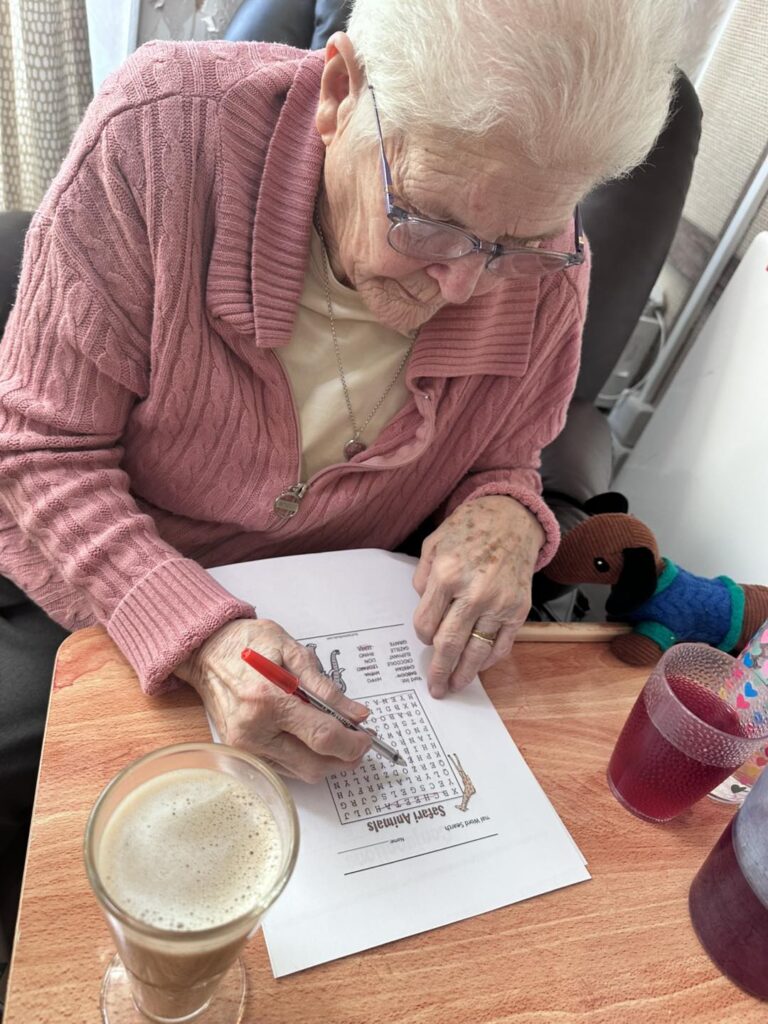
At Huntingdon Court Residential Home, we believe that meaningful moments don’t always have to be big or busy. Sometimes, the quietest activities can have the greatest impact. Recently, residents enjoyed peaceful sessions of colouring and word searches, creating a relaxed atmosphere filled with focus, conversation, and gentle creativity. These simple yet thoughtful activities play an important role in daily life at Huntingdon Court Residential Home, supporting wellbeing while offering residents time to unwind, express themselves, and enjoy shared moments with others. Creating Calm Through Creative Expression Colouring is a wonderfully soothing activity that allows residents to slow down and enjoy the present moment. At Huntingdon Court Residential Home, residents chose from a variety of colouring pages, patterns, and designs, selecting colours that reflected their mood and personality. As pencils and crayons moved across the pages, the room became calm and focused. Some residents worked quietly, fully absorbed in their artwork, while others chatted gently, sharing colour choices and admiring each other’s creations. This balance of calm concentration and social connection is something we value deeply at Huntingdon Court Residential Home. Colouring is known to help reduce stress and anxiety, offering a mindful experience that encourages relaxation. For many residents, it also brings a sense of accomplishment and pride when their finished artwork is complete. Word Searches That Keep Minds Active Alongside colouring, residents also enjoyed completing word searches. These puzzles are a favourite at Huntingdon Court Residential Home, offering a fun and stimulating way to keep minds active while still feeling relaxed and enjoyable. Residents worked independently or alongside one another, scanning the pages for hidden words and celebrating each successful find. Word searches encourage concentration, memory, and problem-solving skills, making them an excellent activity for supporting cognitive wellbeing. There were plenty of smiles and moments of friendly support, with residents helping each other spot tricky words or sharing tips on how to approach the puzzles. These interactions add an extra layer of enjoyment and connection to the activity. Supporting Wellbeing in Everyday Ways At Huntingdon Court Residential Home, we understand that wellbeing is about more than just physical care. Emotional and mental wellbeing are equally important, and activities like colouring and word searches play a valuable role in supporting both. These activities offer structure to the day while remaining flexible and pressure-free. Residents can take part at their own pace, whether for a few minutes or a longer session, and choose how they wish to engage. This sense of choice helps promote independence and confidence. For residents living with memory challenges, familiar activities like colouring and word searches can also provide comfort and reassurance. The familiarity of holding a pencil, following a pattern, or searching for words can spark positive feelings and gentle reminiscence. A Shared Space for Connection Although colouring and word searches can be enjoyed individually, they also create opportunities for connection. At Huntingdon Court Residential Home, residents often gather around tables, sharing conversation while they work. These shared moments help strengthen friendships and create a welcoming, supportive environment. Staff members are always nearby, offering encouragement, joining in conversations, and celebrating residents’ efforts. This relaxed, inclusive approach helps ensure everyone feels valued and supported. Little Activities, Lasting Impact The recent colouring and word search sessions at Huntingdon Court Residential Home were a lovely reminder that small activities can bring great comfort and joy. By offering calm, creative opportunities, we help residents feel engaged, relaxed, and connected. We are proud to provide activities that support wellbeing in simple yet meaningful ways. Whether through creative expression, gentle brain games, or shared conversation, each moment contributes to making Huntingdon Court Residential Home a place where residents feel at ease, inspired, and truly at home To find our stories and updates, follow Huntingdon Court Residential Home Facebook Page For more updates, head over to our Website Here.
Lenthall House Blooms with Creativity During Saturday Flower Arranging
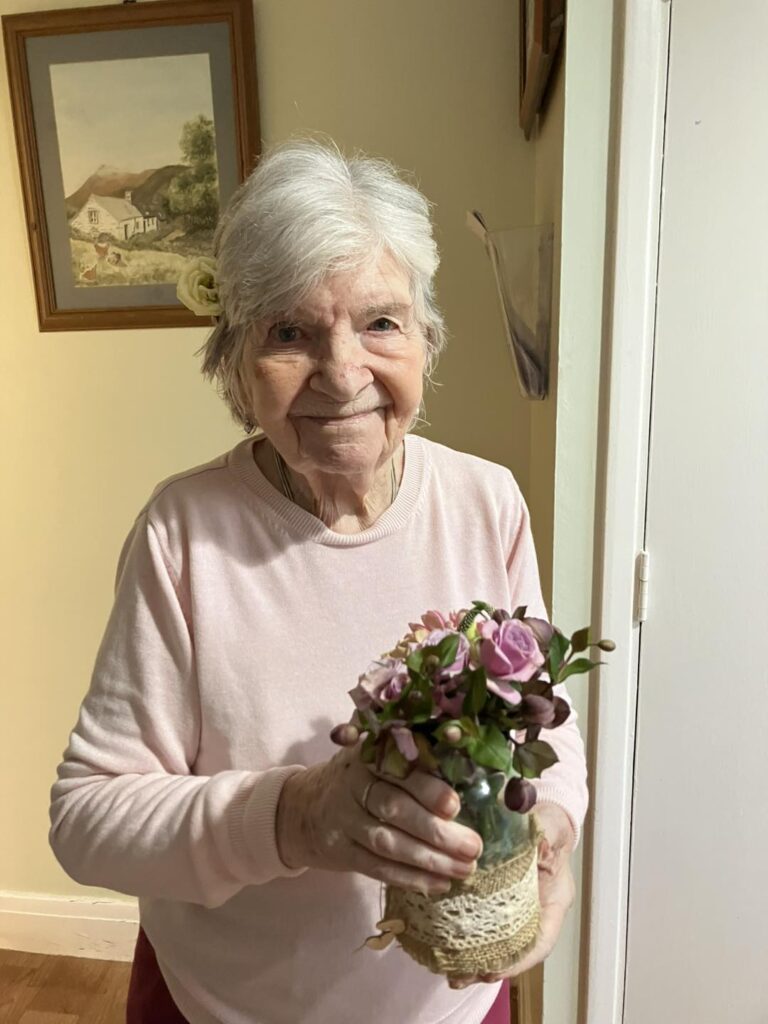
Weekends at Lenthall House are all about slowing down, enjoying the moment, and creating meaningful experiences together. This Saturday was especially lovely as residents took part in a relaxing and creative flower arranging session that filled the home with colour, conversation, and the gentle scent of fresh blooms. Flower arranging is one of those simple activities that brings so much joy. At Lenthall House, it offers residents the chance to express themselves creatively while enjoying a calm, social atmosphere. From selecting flowers to choosing the perfect vase, every step of the process encourages mindfulness, creativity, and connection. A Calm and Colourful Start to the Weekend As residents gathered around the tables, a beautiful selection of flowers was laid out, ready to be arranged. Bright colours, soft petals, and greenery instantly lifted the mood. At Lenthall House, we believe that sensory experiences play an important role in wellbeing, and flowers are a wonderful way to engage sight, touch, and even memory. Residents chatted as they worked, sharing thoughts on which colours complemented each other best and reminiscing about gardens they once tended or flowers they loved growing. For many, handling fresh flowers brought back fond memories of home, family, and special occasions. Creativity at Every Pace One of the most special things about activities at Lenthall House is that everyone can take part in their own way. Some residents carefully planned their arrangements, thoughtfully placing each stem, while others enjoyed a more relaxed approach, letting creativity flow naturally. Staff were on hand to offer gentle guidance and encouragement, but the focus remained on enjoyment rather than perfection. Every arrangement was unique, reflecting the personality and creativity of the resident who made it. Seeing the pride on residents’ faces as they admired their finished displays was truly heartwarming. More Than Just Flowers While the flowers were beautiful, the real magic of the session was the atmosphere it created. Flower arranging at Lenthall House is about much more than creating a display — it’s about connection. Residents talked, laughed, and supported one another, creating a sense of togetherness that is at the heart of life here. These shared moments help strengthen friendships and build confidence. For residents who may feel quieter or less inclined to join larger group activities, flower arranging provides a gentle, welcoming way to engage and feel included. Supporting Wellbeing Through Gentle Activities Activities like flower arranging play an important role in supporting emotional and mental wellbeing at Lenthall House. The act of working with flowers can be incredibly calming, helping to reduce stress and promote relaxation. It also encourages fine motor skills, concentration, and creativity, all of which contribute positively to overall health. For residents living with memory challenges, flowers can also spark conversation and recollection. Familiar scents or colours often prompt memories of past experiences, leading to meaningful discussions and moments of connection with others. Brightening the Home, One Arrangement at a Time Once completed, the floral arrangements were proudly displayed around Lenthall House, adding warmth and beauty to communal spaces. Residents loved seeing their creations brighten the home, and many enjoyed pointing out their own arrangements to visitors and staff. These displays serve as a lasting reminder of a peaceful, enjoyable Saturday spent together. They also help create a welcoming, homely environment — something we strive for every day at Lenthall House. Looking Forward to More Creative Moments Saturday’s flower arranging session was a wonderful example of how small, thoughtful activities can make a big difference. At Lenthall House, we are committed to offering experiences that nurture creativity, encourage social interaction, and bring genuine happiness to our residents. We look forward to many more creative weekends filled with colour, conversation, and shared smiles. Whether it’s flowers, crafts, or other hands-on activities, each moment spent together helps make Lenthall House a place where residents feel valued, inspired, and truly at home. To find our stories and updates, follow Lenthall House Facebook Page. For more updates, head over to our Website Here.
Lenthall House Residents Learn Valuable Fire Safety Tips from Local Fire Brigade
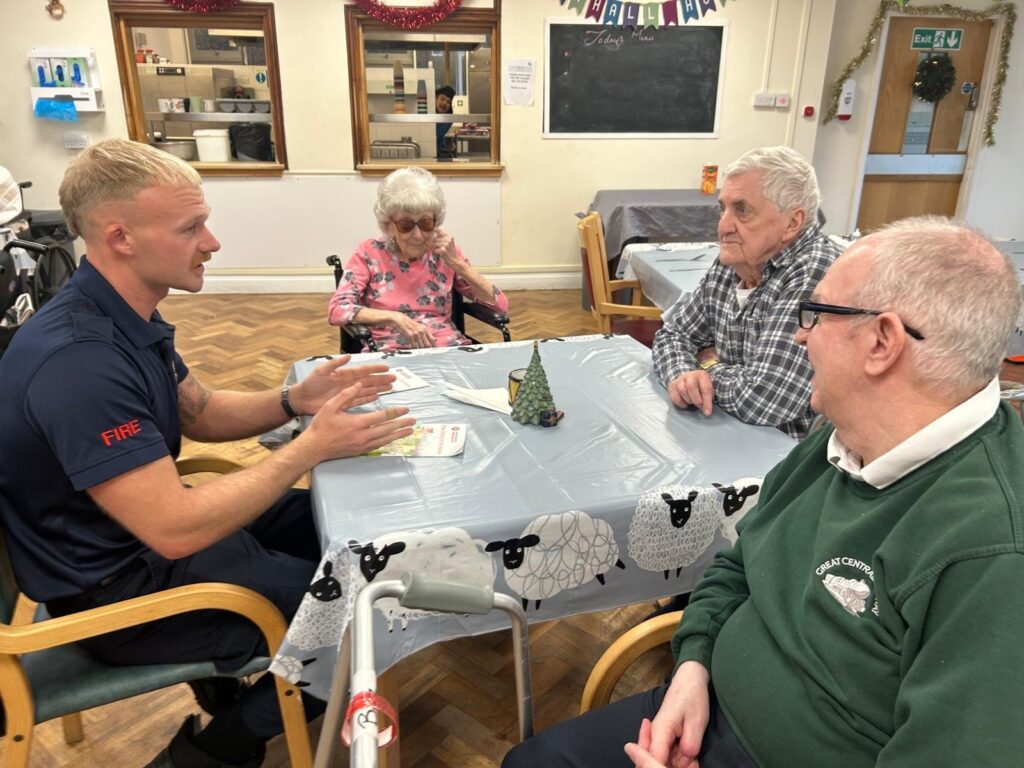
At Lenthall House, resident safety is always a top priority — and this week, we were fortunate to welcome the Leicestershire Fire Brigade for a friendly and informative visit. Their team joined us for an engaging afternoon chat, sharing essential fire safety guidance, practical tips, and important advice on staying safe in everyday life. What began as a simple visit quickly turned into a lively discussion, filled with curiosity, reassurance, and plenty of cups of tea. A Warm Welcome and a Relaxed Discussion The firefighters were warmly welcomed by everyone at Lenthall House, and residents were immediately put at ease by their approachable and down-to-earth nature. Instead of a formal presentation, the session felt more like a friendly conversation. The firefighters sat among the residents, chatted openly, and encouraged questions at every step. Residents were eager to engage, asking thoughtful questions about what to do during an emergency, how they can stay safe at home, and what procedures the fire brigade follows when attending a call. Every answer was given with patience, clarity, and a touch of humour — making the discussion enjoyable as well as educational. Learning What to Do in an Emergency One of the most valuable parts of the visit was the guidance on what to do in the event of a fire. The firefighters explained the importance of staying calm, raising the alarm quickly, and following evacuation procedures. They demonstrated how smoke alarms work and why maintaining them is essential. For many residents, especially those living with mobility challenges, it was reassuring to hear that the fire brigade has specific protocols to support people who may need extra help. This helped build trust and confidence, reminding everyone that they are not alone in an emergency. Everyday Safety Tips That Make a Big Difference The conversation didn’t stop at fire safety. The firefighters also shared broader advice on staying safe in daily life, covering simple but essential tips such as: Keeping walkways clear to avoid trips or falls Being cautious with cooking appliances Checking electrical items regularly Ensuring doors and windows are secure Knowing when and how to call for help These practical reminders are especially important for older adults, and the residents of Lenthall House appreciated having the chance to ask questions directly to the experts. A Session That Sparked Confidence and Reassurance For many residents at Lenthall House, the visit was not just informative — it was empowering. Safety can sometimes feel overwhelming, but hearing guidance in such a friendly and relaxed way helped ease worries and build confidence. Several residents commented on how reassuring it was to hear the firefighters explain things so clearly. Others shared personal stories, discussed past experiences, or expressed gratitude for the work the fire brigade does in the community. The firefighters responded with kindness, emphasising that they are always ready to help and that no concern is too small to mention. Building Community Connections Visits like this strengthen the bond between Lenthall House and our local community. The Leicestershire Fire Brigade didn’t just provide information — they built relationships. Their warm, approachable manner made residents feel respected, heard, and supported. As one staff member said, “It was lovely to see the residents so engaged. Everyone learned something today — and had fun doing it.” By the end of the session, it felt like we weren’t just talking to professionals, but to friends who genuinely care about the wellbeing of our home. A Heartfelt Thank-You We are extremely grateful to the Leicestershire Fire Brigade for taking the time to visit Lenthall House, answer questions, share their expertise, and join us for a cuppa. Their visit made a real impact — giving residents greater awareness, confidence, and peace of mind. At Lenthall House, we remain committed to creating a safe, supportive, and informed environment for everyone who lives here. Welcoming community partners like the Fire Brigade helps us continue that mission in meaningful and memorable ways. To find our stories and updates, follow Lenthall House Facebook Page. For more updates, head over to our Website Here.
Kirby House Residents Enjoy an Unforgettable Wild Day Out at Twycross Zoo
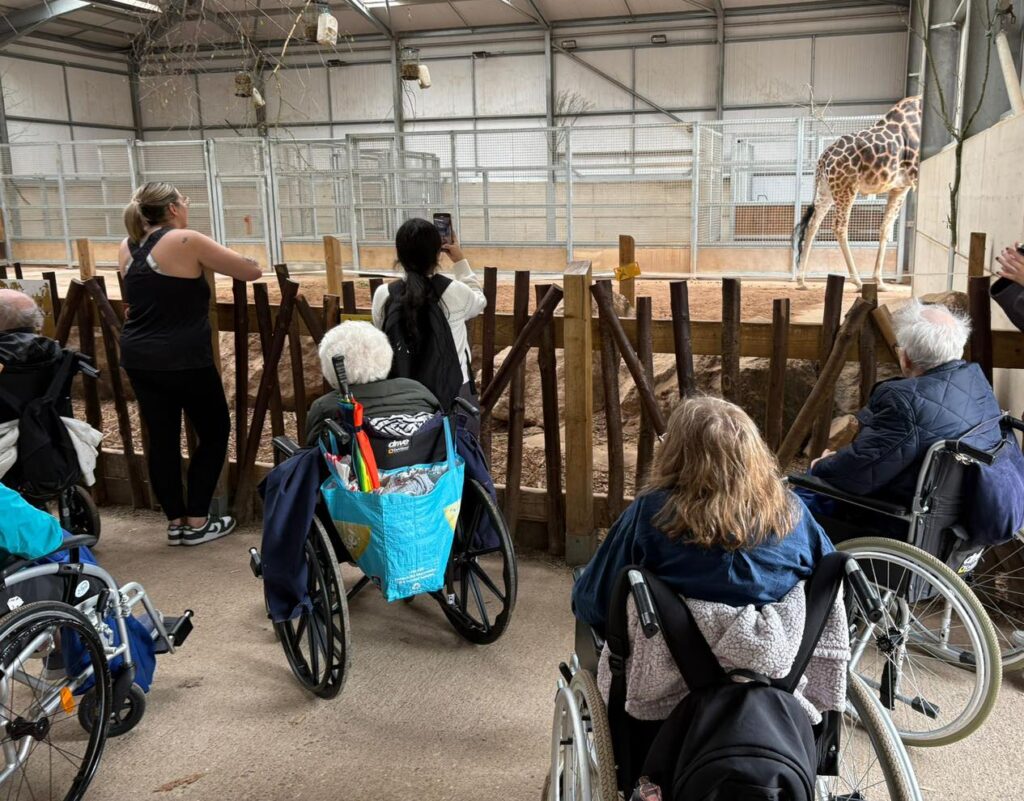
At Kirby House, we believe that life should always be filled with new experiences, shared laughter, and unforgettable memories. That’s why our recent Wednesday outing to Twycross Zoo was such a special treat for residents and staff alike. It wasn’t just a trip to see the animals—it was a day of joy, discovery, and togetherness that everyone will remember for a long time. A Day of Adventure The excitement started well before we arrived at Twycross Zoo. As the coach pulled up outside Kirby House, residents chatted about their favourite animals, swapped stories of past zoo visits, and guessed which creatures they might see first. For many, it had been years since their last zoo adventure, and the anticipation was clear in every smile. When we arrived, the sights and sounds of Twycross Zoo greeted us immediately. From the chatter of exotic birds to the playful antics of monkeys, there was something to enjoy at every corner. Residents loved pointing out the animals to one another, sharing their knowledge, and reminiscing about trips they had once taken with their children and grandchildren. Encounters with the Wild One of the highlights of the trip was visiting the giraffes. Residents were amazed by their towering height and graceful movements, sparking conversations about travel, safaris, and the wonder of the natural world. The penguins were another favourite—waddling, diving, and splashing around, much to the delight of everyone watching. Perhaps the most memorable stop of the day was the primate enclosures. The monkeys’ cheeky behaviour and boundless energy brought plenty of laughter, with residents comparing them to playful children. These lighthearted moments made the day extra special, as they reminded us all that joy can be found in the simplest of places. More Than Just a Trip While the animals were the main attraction, the outing was about so much more than that. Days like this strengthen the sense of community that makes Kirby House such a warm and welcoming home. Residents enjoyed being out in the fresh air, sharing stories, and experiencing something new together. Trips like this also play a vital role in wellbeing. They encourage physical activity, mental stimulation, and social interaction—all of which are so important for a happy and fulfilling life. At Kirby House, we are always looking for ways to go beyond the everyday and create moments that bring a spark of adventure into our residents’ lives. Memories to Treasure Back at Kirby House, the conversations about the day didn’t stop. Over tea and biscuits, residents laughed as they shared their favourite parts of the trip and compared the animals they enjoyed most. Some even spoke about how the zoo reminded them of family holidays or days out from years gone by, sparking warm nostalgia and happy storytelling. We also captured plenty of photos from the day, which residents have proudly shown to their families. These pictures aren’t just snapshots of animals—they are reminders of a joyful day spent together, full of connection and fun. Looking Forward At Kirby House, outings like our trip to Twycross Zoo are part of our commitment to creating meaningful experiences. We know that every adventure, big or small, enriches the lives of our residents and gives them stories to tell and memories to treasure. As we look ahead, we are already planning more days out—whether that’s to local attractions, community events, or even just a stroll through a nearby park. Because at Kirby House, every moment matters, and every resident deserves the chance to enjoy new adventures. Final Thoughts Our trip to Twycross Zoo was more than just a day out; it was a celebration of life, laughter, and the simple joy of being together. For the residents of Kirby House, it was a reminder that no matter your age, there’s always room for discovery, delight, and a little bit of wild adventure. At Kirby House, we’ll continue to create opportunities like this—because it’s these experiences, filled with smiles and stories, that truly make a house a home. To find our stories and updates, follow Kirby House Facebook Page. For more updates, head over to our Website Here.
Huntingdon Court Residential Home and Harvey House: The Little Things That Mean the Most

At Huntingdon Court Residential Home, we believe it’s the little things in life that create the biggest smiles. A thoughtful word, a shared memory, or even a handmade gift can brighten someone’s day more than we often realise. Recently, our residents had the joy of exchanging letters and gifts with our sister home, Harvey House, and it reminded us just how powerful these small gestures can be. A Letter That Sparked Smiles Not long ago, Huntingdon Court Residential Home received a heartfelt letter from Harvey House. Residents gathered together as we read the kind words aloud, sparking conversations, laughter, and stories of their own days of letter writing. For many, it brought back memories of a time when the post arriving was the highlight of the day—when families and friends shared news, updates, and love across carefully chosen stationery and handwritten words. It was more than just a letter. It was a reminder of connection, of friendship, and of being thought about. These are feelings that mean so much to our residents, making them feel valued and included in something bigger. A Gift from the Garden In return, our residents wanted to do something special for Harvey House. The idea of creating a handmade dried flower picture came to life—flowers carefully picked from our beautiful garden here at Huntingdon Court Residential Home, dried, arranged, and framed with love. For many of our residents, the activity itself was just as rewarding as the gift. Collecting flowers from the garden gave everyone a chance to enjoy the sunshine, talk about their favourite blooms, and reminisce about gardens they once tended themselves. The process of crafting the dried flower picture was equally meaningful, as residents shared stories, helped each other, and felt the pride of creating something unique with their own hands. The finished piece was more than just a decoration. It carried the fragrance of our garden, the care of our residents, and the spirit of Huntingdon Court Residential Home—a home filled with thoughtfulness and creativity. Words from the Heart To make the gift even more special, our residents paired it with a handwritten letter and a heartfelt poem. This extra touch showed not only gratitude for Harvey House’s kind letter but also the joy our residents felt in giving something back. In an age where most communication happens digitally, taking the time to write with pen and paper feels especially meaningful. There’s something deeply personal about handwriting—every curve and line tells a story, and the thought behind each word makes the message timeless. Building Bonds Across Homes Exchanges like this one with Harvey House highlight the importance of community and connection, not only within Huntingdon Court Residential Home but also with our wider family of sister homes. They help create bonds that go beyond walls and remind our residents that they are part of a larger, supportive community. Residents now look forward eagerly to receiving the next letter in return. They talk about it over tea, wonder what stories or drawings might be included, and feel the excitement of waiting for a surprise. This anticipation adds something special to their days and gives everyone a sense of belonging. The Power of the Little Things It is often said that happiness lies in the little things, and here at Huntingdon Court Residential Home, we see this truth every day. A small act of kindness, like a handwritten note or a handmade gift, can uplift spirits, create joy, and strengthen friendships. These little things are not little at all—they are the heart of what makes life meaningful. They bring comfort, spark memories, and remind residents that they are loved and appreciated. Looking Ahead with Joy At Huntingdon Court Residential Home, we are committed to finding creative and thoughtful ways to enrich the lives of our residents. Whether it’s through letter writing, crafting, gardening, or simply sharing stories over a cup of tea, our goal is always to make every day special. The dried flower picture and the letter to Harvey House were not just gifts; they were symbols of friendship, love, and community. They showed that even the simplest gestures can create lasting happiness. As we await the next exchange, our residents are already thinking of more little ways to spread joy. Because here at Huntingdon Court Residential Home, we know it’s the little things that truly mean the most. For more details about the homes, visit our websites – Huntingdon Court Residential Home | Harvey House Stay updated by following our Facebook pages – Huntingdon Court Residential Home Facebook Page | Harvey House Facebook Page
Lenthall House Uplifting Wellbeing: Simple Exercises that Make a Big Difference
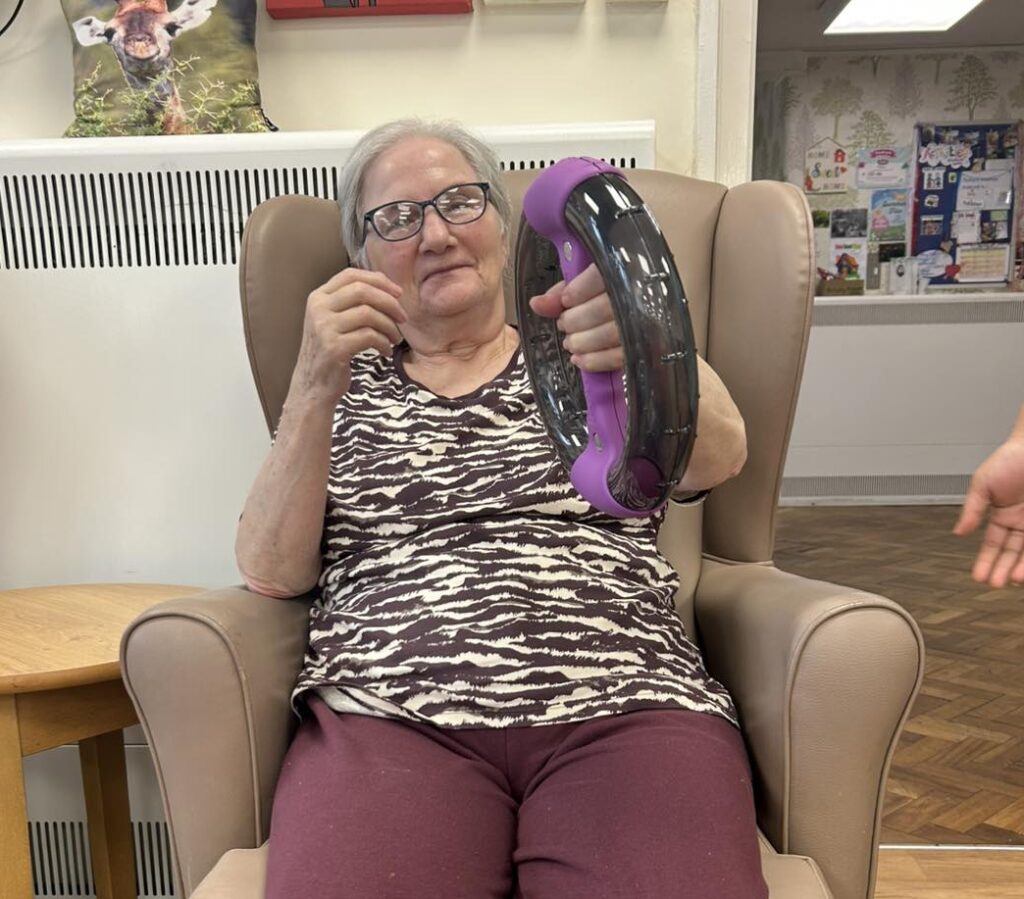
At Lenthall House, we believe that health and happiness go hand in hand—and that even the smallest steps can create meaningful change. That’s why we put such a strong focus on exercise and movement for our residents. Staying active in later life doesn’t need to be complicated or tiring. Instead, it’s about making activity accessible, enjoyable, and tailored to each individual’s needs. Our latest exercise sessions highlighted exactly that. From gentle pedalling on small seated exercise bikes to tossing colourful beanbags, our residents took part in activities that were simple, engaging, and—most importantly—fun. The smiles and laughter in the room proved that wellbeing truly comes alive when people move together. The Transformative Power of Gentle Exercise At Lenthall House, we know that the word exercise can sometimes feel intimidating. But exercise doesn’t have to mean running marathons or lifting heavy weights. In fact, some of the most effective activities for older adults are those that focus on gentle movements and steady progress. Gentle exercise brings a whole host of benefits, such as: Improving flexibility and mobility in everyday tasks Strengthening muscles and protecting joints Enhancing balance, reducing the risk of falls Supporting circulation and heart health Boosting mood and mental wellbeing But the transformative part goes beyond physical health. When our residents come together to move, stretch, or pedal, they are also connecting with one another. They cheer each other on, share in little victories, and leave the session feeling brighter and more confident. Making Movement Enjoyable at Lenthall House What makes our exercise sessions unique is the way we keep them light-hearted and inclusive. We understand that every resident has different abilities and comfort levels, so we offer a range of activities to suit everyone. For some, the pedal exerciser provided a chance to strengthen their legs at their own pace. For others, tossing beanbags into a basket added an element of colour, fun, and coordination. These activities may look simple, but the benefits are far-reaching. Small, consistent movements build strength and energy over time, helping residents feel more capable and independent in their daily lives. And because we keep things playful, participation is something residents genuinely look forward to. Whether it’s celebrating a successful beanbag throw or pedalling for a few minutes longer, each achievement brings a sense of pride. More Than Just Physical Activity While the physical benefits of exercise are clear, at Lenthall House we also recognise the emotional and social value of these group sessions. They are about more than just keeping fit—they are about creating an uplifting environment where residents can laugh, share stories, and feel part of something bigger. A strong sense of community is built in these moments. The encouragement between residents, the collective energy of the group, and the joy of shared accomplishments make these sessions deeply rewarding. For many, exercise becomes less about the movement itself and more about the feeling of connection it creates. Looking Toward the Future The success of these wellbeing sessions inspires us to continue exploring new and creative ways to get our residents moving. From chair yoga and dance sessions to games that blend fun with fitness, we are always looking for opportunities to keep activity fresh and engaging. At Lenthall House, we understand that wellbeing is a journey, not a destination. By offering residents fun and achievable ways to stay active, we empower them to enjoy the transformative effects of movement—day by day, step by step. A Home Where Wellbeing Thrives Ultimately, our goal is simple: to make Lenthall House a place where every resident feels cared for, supported, and inspired to live fully. Wellbeing is at the heart of our approach, and exercise is just one of the many ways we bring joy and vitality into daily life. As our residents pedalled, stretched, and tossed their beanbags, it was clear to see that small movements can have a truly transformative impact. At Lenthall House, we’ll continue to nurture both body and spirit—because when our community thrives, every day becomes brighter. To find our stories and updates, follow Lenthall House Facebook page here For more updates, head over to our website here
Kirby House and the Small Joys of Baking Together
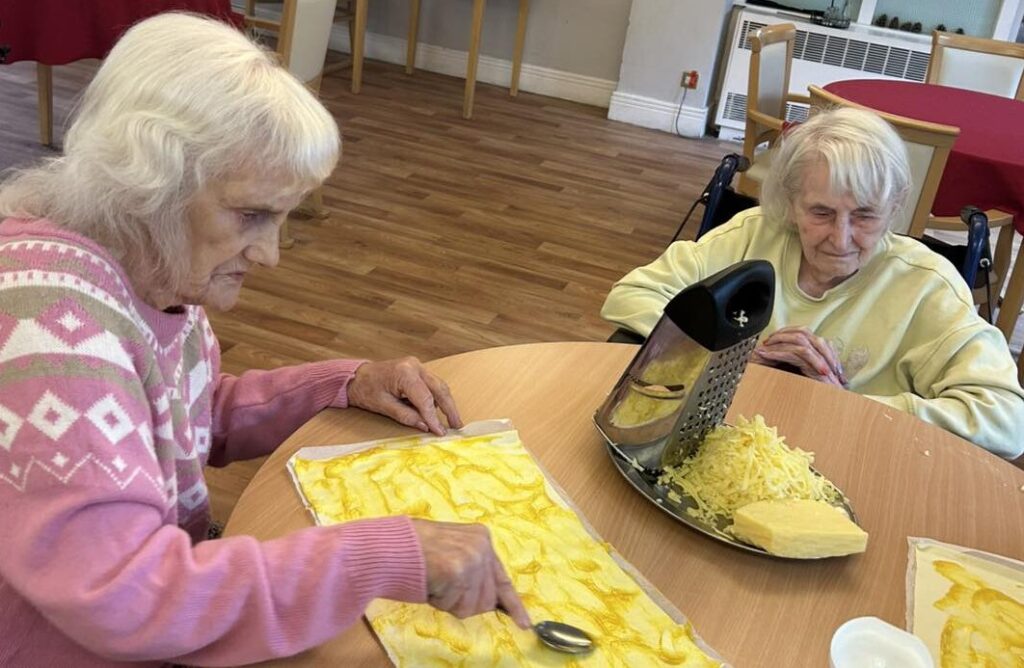
At Kirby House, the smell of freshly baked cakes and biscuits doesn’t just fill the kitchen—it fills hearts. Baking is more than just a pastime here; it’s a cherished tradition, a chance for residents to connect, share stories, and enjoy the small but deeply satisfying moments that make life richer. The Magic of Baking in a Home Setting Baking has a unique way of bringing people together. It’s a hands-on, sensory experience that sparks conversation and memories. For many of our residents, baking is tied to fond recollections—Sunday afternoons with family, festive holiday preparations, or learning special recipes from parents and grandparents. At Kirby House, we’ve embraced baking as a regular activity because it’s as much about the process as it is about the result. The gentle rhythm of stirring, the soft feel of flour between fingers, and the anticipation as the oven timer ticks down—these moments create a sense of calm and joy that everyone can share. A Recipe for Connection Recently, our kitchen buzzed with excitement as residents came together to bake a batch of biscuits and a sponge cake. Some took on the role of measuring ingredients, others mixed and stirred, and of course, there were plenty of volunteers for “quality control” when the time came to taste the results. It wasn’t just about making something delicious; it was about the conversations that flowed in between. Residents swapped tips, compared family recipes, and reminisced about their own baking adventures from years gone by. In that kitchen, friendships grew a little stronger, and laughter came easily. Why Baking Matters at Kirby House We know that the emotional and social benefits of activities like baking are just as important as the end product. Baking engages multiple senses—sight, smell, touch, and taste—which can be particularly meaningful for older adults. It can also stir up positive memories, promote mindfulness, and encourage collaboration. At Kirby House, our goal is to create a homely environment where residents feel valued and involved. Activities like baking aren’t just “something to do”—they are opportunities for residents to be active participants in their community. The shared sense of achievement when a tray of golden biscuits emerges from the oven is a joy in itself. Small Joys with Big Impact One of the loveliest parts of our baking afternoons is seeing how proud residents are to share their creations. Plates of warm biscuits make their way to the lounge, slices of sponge cake are offered around, and the atmosphere becomes just that little bit warmer. It’s in these moments—over a shared plate of treats and a cup of tea—that we see the real magic of Kirby House. The small joys of baking together ripple out into the rest of the day, leaving smiles and sweet memories behind. Keeping Traditions Alive Many of our residents grew up in a time when baking was an essential skill and a central part of home life. By making it a regular part of life at Kirby House, we’re not just creating tasty treats—we’re helping to keep those traditions alive. We often hear residents say, “I haven’t made this in years!” and watch their faces light up as they roll out dough or decorate a cake. It’s a reminder that these skills and memories are still very much a part of who they are. Looking Forward to the Next Bake Baking days have become something to look forward to at Kirby House. Whether it’s seasonal treats for Christmas, a birthday cake for a fellow resident, or simply biscuits for afternoon tea, these sessions are a celebration of togetherness. Our residents know that when the mixing bowls come out, good things—both edible and emotional—are on the way. Click Here and follow our Facebook page for heartwarming stories and the latest happenings at Kirby House. Visit our website to discover how Kirby House creates a warm and welcoming home for every resident.
Thurncourt Residential Home Shares Heartwarming Moments of Friendship

At Thurncourt Residential Home, we believe that friendship is one of the most valuable treasures in life—especially for our residents who call our home their own. What makes these friendships so special is that they are often built on small, meaningful gestures that happen every day. It’s not always the big events or grand celebrations that matter most, but the tiny moments: a smile exchanged across the room, a kind word, a helping hand, or sharing a simple treat. These sweet moments become the foundation of strong and lasting friendships. The Little Things That Mean So Much Sometimes, it’s easy to overlook the power of small actions. But here at Thurncourt Residential Home, we see their impact every day. Take Audrey and Hazel, two wonderful residents who have developed a heartwarming friendship through such gestures. They are known among staff and fellow residents for always looking out for each other—checking in, sharing stories, and supporting one another through good days and bad. Recently, on World Friendship Day, Audrey and Hazel shared a simple but deeply meaningful moment—they enjoyed a bar of chocolate together. This sweet act was more than just a snack; it was a celebration of their friendship and the caring bond they share. Moments like these remind us that friendship in residential care is nurtured through kindness and presence, not just words. Building a Community Through Everyday Interactions Friendship is the heart of community life at Thurncourt Residential Home. We understand that moving into residential care can feel daunting, and for many, it means leaving behind familiar places and routines. But here, residents quickly find that they’re never alone. The atmosphere is welcoming, supportive, and filled with opportunities to meet others and forge friendships. From group activities like gardening, music sessions, arts and crafts, to informal chats over tea or during meals, the home is alive with interaction. These settings create natural moments for people to connect, learn about each other’s lives, and build trust. The friendships formed often become a source of joy and emotional support, making every day brighter. Why Friendship Matters So Much in Residential Care Friendships are essential to emotional and mental wellbeing. They provide companionship, reduce feelings of loneliness, and promote a positive outlook on life. Research shows that social connections contribute significantly to health and happiness, particularly for older adults. At Thurncourt Residential Home, we prioritize creating a nurturing environment where these connections can thrive. Our care team supports residents not only in their physical needs but also in building social bonds. We encourage participation in activities and foster a culture where kindness and respect are core values. For residents like Audrey and Hazel, having a close friend means having someone to share memories with, to support during challenges, and to celebrate successes. It’s a reminder that no matter the stage of life, friendship enriches our experiences and brings meaning. Small Gestures Create Lasting Memories The story of Audrey and Hazel sharing chocolate is a perfect example of how small moments can create lasting memories. Such gestures, though simple, have a profound impact. They show thoughtfulness, consideration, and the joy of sharing. It’s these small acts that often lead to the strongest friendships. Sitting together in the lounge, helping one another with hobbies, exchanging smiles in the hallway—these are the building blocks of companionship and trust. At Thurncourt Residential Home, we celebrate these moments daily because they contribute to a vibrant, caring community. We see friendships bloom, and we see how they transform a residential house into a warm, welcoming home. A Home Where Everyone Belongs Our commitment at Thurncourt Residential Home is to ensure that every resident feels valued, included, and connected. We believe that true care includes fostering friendships and emotional wellbeing. Whether it’s through sharing a bar of chocolate like Audrey and Hazel, taking part in community events, or simply spending time chatting with a neighbour, friendships help residents feel secure and happy. In the end, it’s these sweet moments—the smiles, the shared experiences, the little acts of kindness—that turn a building into a home and make the journey of residential care meaningful. Follow Thurncourt Residential Home Facebook page here to get more updates To learn more about Thurncourt Residential Home, visit our website here
Cooper House Care Home Welcomes Winni the Therapy Dog: A Heartwarming Day of Paws and Smiles

At Cooper House Care Home, we believe that the best days are filled with warmth, companionship, and moments that make us smile. One of those days recently came to life with the arrival of a very special visitor—Winni, the gentle and majestic Tibetan Mastiff, who brought with her not just cuddles and curiosity, but a lot of joy and conversation. Accompanied by her loving human, Adrian, Winni made quite the impression from the moment she stepped through the doors of Cooper House Care Home. With her thick, fluffy coat and calm, affectionate nature, Winni had everyone smiling in minutes. Residents and staff alike were instantly drawn to her presence—many couldn’t resist running their hands through her luxurious fur, while others were happy just to sit by her side. Animal Companionship: A Simple but Powerful Joy One of our ongoing goals at Cooper House Care Home is to find meaningful ways to connect with and enrich the lives of our residents. We know how important companionship, stimulation, and emotional connection are in maintaining well-being—and visits like Winni’s are a wonderful way to provide all three. Therapy dogs have a unique ability to bring comfort and connection, especially for older adults. As Winni made her way around the lounge, residents were reminded of the pets they once had. Some shared touching stories of beloved dogs they’d cared for many years ago. Others simply enjoyed the opportunity to be close to such a calm and affectionate animal. For residents living with dementia, Winni’s presence was particularly moving. The simple act of petting her seemed to unlock memories and feelings that might otherwise stay tucked away. These moments—small yet profound—are why experiences like this are so important to us at Cooper House Care Home. Winni the Tibetan Mastiff: A Gentle Giant Winni is no ordinary dog. As a Tibetan Mastiff, she belongs to one of the world’s most ancient and noble breeds—renowned for their intelligence, loyalty, and striking appearance. But beyond her size and beauty, it’s Winni’s temperament that left the biggest impression. Adrian, her owner, took the time to answer the many questions that followed her arrival. How big is she? What does she eat? How often does she need grooming? Residents were fascinated to learn more about her life, and Adrian’s patience and warmth helped create a relaxed and friendly atmosphere throughout the visit. Winni calmly moved from resident to resident, taking her time to offer affection and companionship. She seemed to sense when someone needed a quiet moment of connection or when a cheerful nudge would spark a smile. Her presence filled the room with a gentle energy that lingered long after she left. A Visit That Stays in the Heart Even after Winni and Adrian said their goodbyes, the stories and conversations continued. For days afterward, the residents of Cooper House Care Home were still talking about her. Many shared photos with their families, reminisced about their own beloved pets, and asked—sometimes with a smile—when she might visit again. It’s these moments that truly matter. At Cooper House Care Home, we are committed to creating a warm, vibrant, and caring environment that nurtures the emotional and social wellbeing of every resident. Visits from therapy animals like Winni aren’t just delightful—they’re deeply therapeutic, comforting, and uplifting. We will continue to explore creative and meaningful ways to bring happiness to those in our care—whether through animal visits, community engagement, or simple, heartfelt connections. After all, it’s often the little things—a wagging tail, a gentle nuzzle, or a shared smile—that help make Cooper House Care Home feel not just like a place to live, but a true home. For more updates follow Cooper House Care Facebook Page Here To find out more about Cooper House Care Home, head over to our website here
A Remarkable Journey Through Time: Joyce’s Legacy at Arbor House Care Home in Leicester

Arbor House Care Home, a leading care home in Leicester, has been a cornerstone of our community, providing exceptional care and companionship to countless individuals over the years. Among our cherished residents, Joyce holds a unique place in our hearts, not only for her vibrant presence but also for her remarkable history with Arbor House. Joyce became a resident at Arbor House Care Home on December 5, 2016. Her connection to our home, however, spans much further back. In the 1970s, Joyce dedicated herself to the well-being of others as a care assistant here at Arbor House in Leicester. Now in her 90s, she frequently reminisces about her days working with the staff and residents, sharing stories that enrich our understanding of Arbor House’s history and the evolution of care homes in Leicester. Recently, Joyce’s son brought in a collection of photos from her time working here. These precious snapshots capture moments of joy and community during holiday celebrations and entertainment events. Seeing these pictures, one can sense the warmth, trust, and friendship that Joyce fostered among her colleagues and the residents. Her dedication and passion for her work are evident in every smile and shared moment captured in these images. Today, Joyce remains an active and beloved member of our Arbor House Care Home family. She participates in various activities with enthusiasm, proving that her caring spirit and lively personality continue to thrive. Whether it’s joining in on arts and crafts, enjoying musical performances, or simply sharing stories with fellow residents, Joyce’s presence is a testament to the lasting impact of her dedication and kindness. Her involvement in our community activities not only enriches her life but also enhances the lives of those around her, creating a vibrant and inclusive atmosphere at Arbor House. Joyce’s life is a beautiful reminder of the enduring bonds we create in our journey of caring for others. Her stories and photographs not only highlight the rich history of Arbor House Care Home in Leicester but also inspire us to continue building a nurturing and joyful community. Her experiences serve as a bridge between the past and present, illustrating the timeless values of compassion and community that Arbor House embodies. We are privileged to have Joyce with us, both as a treasured resident and a living link to our past. Her legacy is woven into the fabric of Arbor House Care Home, and her stories enrich the lives of everyone who has the pleasure of knowing her. Joyce’s journey from a dedicated care assistant in the 1970s to a cherished resident today underscores the deep, personal connections that define the essence of Arbor House. As we look at the photos of Joyce from the 1970s and today, we see a lifetime of compassion and commitment. Joyce’s journey through time at Arbor House Care Home is a poignant reminder of the lasting impact one individual can have on a community. Her legacy is a testament to the exceptional care and sense of family that Arbor House provides to all its residents. Our Care Home Manager, Gladys proudly introduce Joyce to everyone of us where Joyce tells wonderful stories reminisensing about her work and the home in the 70s. If you are looking for a care home in Leicester that values its residents’ history and creates a warm, engaging environment, Arbor House Care Home is your ideal choice. Our dedicated staff and vibrant community ensure that every resident feels at home, just as Joyce has experienced throughout her years here. At Arbor House, we honour our past while creating a bright and loving future for all our residents. We are committed to providing exceptional care that reflects the rich history and values of our community. Please visit our Facebook page here to know more on what is going on at Arbor House. Please visit our Arbor House website to know more about Arbor House and the services we provide
